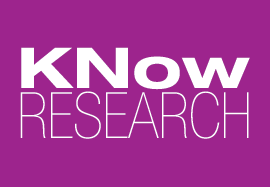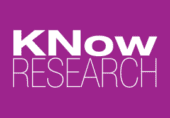A Nod to Learning from Nonprofits in Market Research
Last year, after a decade working in communications, strategy, and research in the nonprofit sector, interviewing for jobs in the corporate sector was intimidating. I distinctly remember my first interview with KNow Research. I was terrified, uncertain of where I belonged in an insights firm that serves Fortune 500 clients. Our Founder and CEO, Katrina, picked up on my consternation immediately. “It seems like you are apologizing for coming from the nonprofit sector.…” she said, observing my flustered and apologetic responses to the most basic questions. And frankly, she was right.
My last position was in a small technology and community engagement nonprofit, where I was responsible for leading our program assessment work to chart our organizational impact. It was incredibly rewarding, but it was only about 20% of my job; newsletters still had to be sent and group dialogues facilitated. While there was a fulfilling frenzy to being a jack of all trades, I yearned for more opportunities to specialize and to grow specifically as a qualitative researcher, a role I found much more common in the business community. Now, as a Research Strategist with KNow, I am focused on building holistic insights strategies that lift up the voice of consumers, building on my experience of lifting up the voices of our program participants.
It turns out, my worlds are not as separate as I feared, and there are more shared values than I imagined. Scrappiness is a central value for many nonprofits just as it is in our work at KNow – trying something new, bending without breaking, and asking big questions about how we can do things differently. I am still able to see the impact of our work in the world around me, through KNow’s annual large pro-bono project traditionally reserved for nonprofits. Katrina has even presented on why Nonprofits Need Research Too, where she offers affordable tips and tricks for nonprofits to incorporate qualitative research into their programs. While nonprofits can certainly learn from the insights industry, I believe the reverse is true as well; in fact, breaking down the silos between sectors can amplify and deepen the impact of both types of organizations. Here are 4 key lessons the insights industry can learn from the social impact sector – both at the individual and at the company level – as we approach our work.
Consider systems-thinking
As insights professionals, we are deeply attuned to individual stories, which we weave into a narrative that provides understanding, information, and strategy. Nonprofits also listen to the voices of those they serve to humanize their work for donors and the wider community. An important part of their approach to storytelling is to contextualize their work in systems thinking, which uncovers patterns, structures, and mindsets that lie at the root of complex problems. No challenge exists on its own; rather, it is linked to structural issues that are critical to understand when problem-solving. Understanding what prevents certain segments of people from buying lingerie, for example, is certainly linked to questions of product, sales and shopper experience. But it’s also about body image, gender roles, or anti-fat bias. Leading many of these conversations about applying systems thinking to complex problems is the Stanford Social Innovation Review.
Understand the role of power in data
Data is not objective. Thanks to resources like We All Count , a project for equity in data science, and the book Data Feminism, I’ve learned that data is linked to power, and understanding where that power lies is critical when considering your limitations and inadvertent biases. Who collects data, how it is collected, and how it is used are all questions that essentially come down to: access, ownership, and agency. Are we collecting more than we need, exploiting people as mere data points? Are the methods we use further reducing people to a single story, as Chimimanda Adichie has challenged? No matter the subject, we must consider the possibility of inadvertent bias, exclusion, or exploitation in approaching our work. We must all be practitioners of equity and inclusion just as we are practitioners of research; in fact, they validate one another.
Prepare for difficult conversations
We ask people about money, about relationships, about health. We talk about trust, belonging, fear, frustration, and aspirations – none of them shallow subjects. Managing emotionally charged discussion requires being comfortable to pause and create space in which everyone should feel welcome and heard. The dialogue and deliberation field, where I spent much of my career, provides tools that may have been curated in dire circumstances, ethnoreligious conflict for example, but skills in mediation, consensus-building and facilitation can be applied just as much in our setting. I recommend checking out the National Coalition of Dialogue and Deliberation, free resources at Essential Partners, or Everyday Democracy.
Create space for introspection
As qualitative researchers, we are driven by curiosity. We want to know why things work or don’t work, and why. But oftentimes, in the rush of managing projects or meeting deadlines, we overlook applying that gaze to our own backyard. Across sectors, organizations are prioritizing interesting and innovative practices for assessing their culture, mission, and leadership to identify where change is most needed. The Center for Effective Philanthropy deploys the same anonymous assessment tools it gives to clients to its own staff. This practice has unearthed deep, sometimes difficult reflections on job satisfaction, trust in leadership, and values alignment. When we take the time to look inward and have those challenging conversations, we can open lines of communication that ultimately foster a positive and productive work culture. From that first interview to my first blog, I am excited to join arms with my colleagues and others in the field to build that work culture with intentionality and introspection.
No matter what sector we serve, we all have the opportunity to think critically, engage deeply, and learn from one another. As I move into a new role in a very different environment, I look forward to being a part of this learning community with you. We look forward to finding you at the Insights Association annual conference in Philadelphia next week! Join the conversation about how we can collectively bolster #researchforgood #probono at #IA2022.

